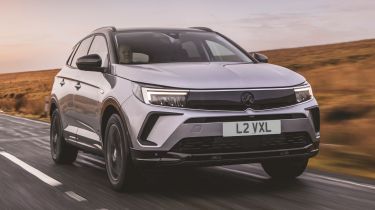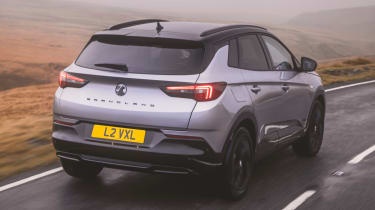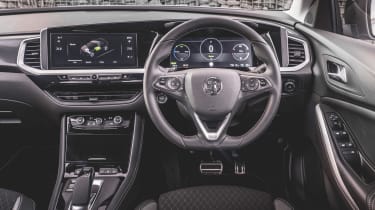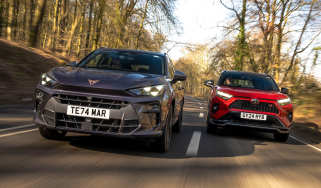Vauxhall Grandland PHEV 2022 review
The plug-in hybrid version of the refreshed Vauxhall Grandland aims to reduce running costs and BiK tax expenses

Verdict
By offering a significant level of electrification the Vauxhall Grandland is relatively refined and should be cheap to run for private buyers and business users. However, despite the efficiency potential the PHEV isn’t perfect and comes with compromises, even if there is a lot of kit on offer.
The 1.2-litre Turbo petrol version of Vauxhall’s updated Grandland SUV might still be the big seller, but to compete in the incredibly crowded mid-size SUV sector in 2022 you have to offer a hybrid, too.
One in six cars sold here last year was an SUV in this class, and electrification is more important than ever for a model’s success. That’s something the British brand knows only too well, which is why this new Grandland is being offered in plug-in Hybrid-e form to cater for company car user-choosers and private buyers looking for more electrification to lower their running costs.
In fact, Vauxhall says that factoring in monthly finance deals, what you’d spend on fuelling and charging the Grandland Hybrid-e would give a close-to-identical all-in monthly cost to the petrol, despite this PHEV’s higher price. Of course, plug in more frequently and cover more local journeys on electric power alone and the car could prove to be the cheaper option to run when all monthly costs are factored in.
Used - available now

2021 Suzuki
Swace
14,450 milesAutomaticPetrol1.8L
Cash £16,490
2020 Mitsubishi
Outlander
41,000 milesAutomaticPetrol2.0L
Cash £18,690
2020 MINI
Countryman
35,000 milesAutomaticPetrol2.0L
Cash £22,990
2022 MG
HS
33,000 milesAutomaticPetrol1.5L
Cash £16,490The Grandland PHEV boasts a 13.2kWh battery that feeds an electric motor for a zero-emissions range of up to 39 miles, says Vauxhall. On the cold day of our test, nearly 30 miles was possible. The powertrain’s electric element works in conjunction with a 1.6-litre turbocharged four-cylinder petrol engine for a total output of 222bhp, which is enough for a 0-62mph time of 8.9 seconds.
However, flat-out is not where the Hybrid-e’s strengths lie. You’re better off leaving the car in the Hybrid driving mode and letting it use its battery power to support the petrol engine, making progress more refined. The e-motor’s added torque means moderate acceleration feels easier and more relaxed than you might imagine, and at a more gentle pace the eight-speed automatic gearbox’s changes are smoother, too.
Not only does the hybrid system help progress and refinement, but with claimed fuel economy of up to 192mpg and CO2 emissions as low as 31g/km (if you plug in to maximise its potential) the electrified Vauxhall should be affordable to run.
It attracts a Benefit-in-Kind tax rate of 12 per cent for the coming tax year, so it’ll be a cost-effective option for business users, too.
While the electric motor aids refinement under acceleration, the extra weight of the system compromises ride quality. On undulating roads the mass feels fairly well contained, but ridges in the road when cornering, and harsher bumps send a jolt through the chassis that results in a sometimes-abrupt body movement and a thump from the wheels, especially at the rear. Again, it’s better if you take a more relaxed approach.
The steering is light, so the Vauxhall is easy to manoeuvre and quick to turn, because there’s also enough grip to deliver a solid feeling of security. However, it’s far from a dynamic SUV choice in this class.
Vauxhall has significantly slimmed down the Grandland range, with the Hybrid-e version available in only two of the three trim levels, GS Line and Ultimate.
Our GS Line test car features glossy black trim, a contrasting black roof, 19-inch alloy wheels, special sports seats with an approved ergonomic design and other sportier touches, such as aluminium pedal covers and tinted windows.
GS Line specification also features a reversing camera and adaptive cruise control with lane-position assist, as well as the brand’s Pure Panel set-up. This boasts a 10-inch colour touchscreen featuring sat-nav, Apple CarPlay and Android Auto, joined by a 12-inch digital dash display.
The former is familiar, taken from parent firm Stellantis’s other brands (namely Peugeot and Citroen). It works relatively well, although the graphics could be sharper and the touchscreen’s response quicker, too. However, it’s the digital dashboard that’s more of an issue; it’s not very slick, lacks customisation potential and feels like a missed opportunity given the possibilities this technology offers.
Material and build quality is fine, while like any other Grandland, there’s plenty of room in the rear seats and visibility is good. Housing a battery for the hybrid system means boot space decreases, from 514 litres in the ICE models down to a much less impressive 390 litres. This is only a little more than a family hatch.But then it’s a compromise you may well accept for the efficiency and running costs potential this Grandland Hybrid-e delivers.
| Model: | Vauxhall Grandland Hybrid-e GS Line |
| Price: | £33,820 |
| Engine: | 1.6-litre 4cyl + e-motor |
| Power/torque: | 222bhp/360Nm |
| Transmission: | Eight-speed automatic, front-wheel drive |
| 0-62mph: | 8.9 seconds |
| Top speed: | 140mph |
| Electric range: | 39 miles |
| Economy: | 192mpg |
| CO2: | 31g/km |
| On sale: | Now |











